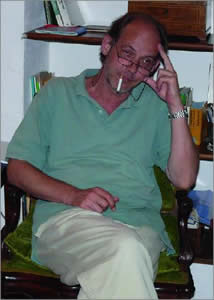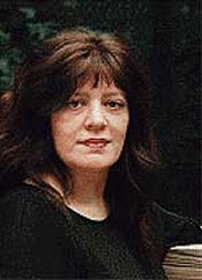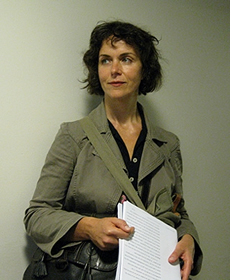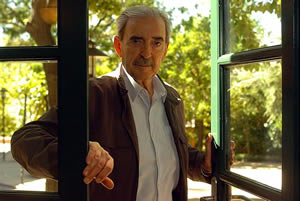De Duitse schrijver Klaus Modick werd geboren in Oldenburg op 3 mei 1951. Zie ook alle tags voor Klaus Modick op dit blog.
Uit: Vatertagebuch
“Freitag, 2. Januar
Emily und Marlene sind auf dem Land aufgewachsen, haben ihregesamte Kindheit bis in die Pubertät zwischen Feld, Wald,Wiesen und See im Mollberger Haus verbracht.
Dennoch wissensie nicht recht, wie mit der umständlichen und antiquierten Technikdes Hauses umzugehen ist. Die Wasserversorgung an- undabzustellen, die Heizungen und Öfen zu bedienen, haben sienicht gelernt, weil das immer von den Erwachsenen erledigt wurde.Jetzt, da sie das Haus nutzen wollen, wächst ihnen mit derleipraktischen Mühen auch Selbständigkeit und Verantwortung zu.Erwachsensein ist eine lästige Angelegenheit.
Ich fahre nach Mollberg, um nachzusehen, ob Marlene nachder Party dort das Haus aufgeräumt und winterfest hinterlassenhat; etwas schlechtes Gewissen dabei, weil’s so nach Kontrolettiaussieht, rechne zwar nicht mit Chaos, aber doch mit geöffnetenFenstern oder/und laufenden Heizungen. Es ist aber alles tadellosin Ordnung. Das Haus, das immer freundliche Geborgenheitausgestrahlt hat, deprimiert mich in seiner verlassenen Kälte undklammen Unbewohntheit. Seit unserem Umzug vor dreieinhalbJahren haben wir dort kaum einen Handschlag investiert. SchleichenderVerfall macht sich breit, den man spüren, sehen und riechenkann, und sobald die Haustür von außen verschlossen ist,tanzen wieder die Mäuse auf dem Tisch. Wir müssen das Hauswohl verkaufen; die Doppelbelastung können wir uns langfristignicht leisten, und die kommenden Jahre werden finanziell nichtleichter. Als Idylle ihrer Kindheit bleibt das Haus den Mädchenvermutlich sogar besser im Gedächtnis, wenn es ihnen real nichtmehr zugänglich ist.”

Klaus Modick (Oldenburg, 3 mei 1951)
De Russische schrijfster Tatjana Tolstaja werd geboren op 3 mei 1951 in Leningrad. Zie ook alle tags voor Tatjana Tolstaja op dit blog.
Uit: The Tragedy Of Tolstoy
“First Memories of Yasnaya Polyana
We are playing lotto. Father enters, his hands behind his leather belt, and looks at us smiling. I feel a great desire to make him like me.
I cannot read yet, but know by heart the inscriptions under all the pictures in my book and pretend to read aloud — “The spruce is always green,” and “The June bug is brown” — at the same time looking sideways to see what impression it makes on him. He is laughing.
Everything that surrounded father seemed especially important: his study with the vaulted ceiling into which big rings were screwed; [Footnote: It was said that in the days when Prince N. S. Volkonskiy owned the house this had been a storeroom and hams were hung on those rings in the ceiling.] the desk, the big, old- fashioned armchair — so long that one could stretch out in it as if in a bed; and the peculiar smell, perhaps of leather and perhaps of old paper, which emanated from all his things. It could not possibly occur to me to take a pencil away from his desk or to draw a smiling or a melancholy pig on one of the scraps of paper that littered it.
What a joyous event it was when father played with us! All of a sudden, after dinner, he would call, “Little ones, come along!” We excitedly run and skip after him to his study. In the corner, near grandfather’s old-fashioned red washstand, stands a laundry basket. Father throws some rags out of it. “Get in! Who’s first?” Vanichka goes in first, because he is the younger. The lid is closed and the basket is carried by father with the help of one of the family or a house guest. Usually this is the task of Aleksandr Nikiforovich Dunayev — Nikiforych as we call him — a friend of the family who is very fond of Vanichka and me. Vanichka in the laundry basket is being carried all over the house, I am running after. Finally the basket is deposited in some unusual place — under the table or on the dresser or in some dark corner. “Vanichka, now guess where you are!” But Vanichka cannot guess, he is too little for that; he only likes to have a ride.“

Tatjana Tolstaja (Leningrad, 3 mei 1951)
De Franse dichteres en schrijfster Agnès Desarthe werd geboren op 3 mei 1966 in Parijs. Zie ook alle tags voor Agnès Desarthe op dit blog.
Uit: La légende du Baron Hachem
„Quand il lui arrivait d’apercevoir son reflet dans un miroir, il songeait qu’une douche serait la bienvenue, mais son cerveau reprenait aussitôt le dessus. Cela peut encore attendre, se disait-il, inutile d e gaspiller du bon savon et de la bonne eau. Il se servait un bol de soupe, dans lequel il avait jeté un flan à la vanille, histoire de faire d’une pierre deux coups, et se rassurait en se répétant que le bien le plus précieux était la faculté de penser et qu’aucune de ses nouvelles manières ne venait l’entraver. Au contraire, il gagnait un temps fou; ce qui le confortait dans l’idée qu’il avait découvert un système de vie tout à fait mirobolant.
Le seul ennui, c’était la solitude, chaque jour grandissante. Les commerçants eux-mêmes refusaient de le servir et sa famille se détachait de lui. Les visites, se firent, puis inexistantes. Les habitants du village ne lui parlaient plus, il parlaient de lui et c’était même un de leurs sujets favoris. Celui qui, autrefois avait porté le surnom de grand sage, se faisait maintenant appeler le grand sale et les gens riaient, ils riaient et se vengeaient, de quoi? C’est un mystère qui en vaut un autre. Toujours est-il que la réputation du Baron Hachem était épouvantable.
Dans ce désert, une seule personne se tourna vers lui. C’était Malki, le voyou.
– Vous et moi, on est pareils, lui dit-il un jour.
– Comment ça, demanda le Baron Hachem, tout étonné qu’on lui adresse la parole.
– Personne ne nous aime, mais on s’en fiche. On se fiche de tout et surtout des autres.
– Jeune homme, dit le Baron Hachem, tu te méprises. J’aime mes semblables et je fais tout ce qui est en mon pouvoir pour améliorer leur quotidien en mettant à l’épreuve la sagesse de mon grand âge.“

Agnès Desarthe (Parijs, 3 mei 1966)
De Vlaamse dichter en schrijver Paul Bogaert werd geboren in Brussel op 3 mei 1968. Zie ook alle tags voor Paul Bogaert op dit blog.
WELCOME HYGIENE
Wat je zei was onverdund.
En het bleek ook efficiënt:
ik zie niks meer. Mijn hoofd is proper
nu en wit. Het is gedaan.
Ik duwde eerst mijn ogen in
en hield mijn hoofd naar achteren.
Dan goot ik de gaten vol
met eau de javel en white spirit.
Dat alles weggaat is een waan.
Het is de lucht die ijlig is.
Geef me tijd om bij te komen.
Begraaf me waar ik water
vroeg en laat me zijn – buiten bereik –
van vis.
Dit is de eeuw van de knoppen
Dit is de eeuw van de knoppen.
Elke foto wordt sceptisch bekeken,
ook al toont ze de realiteit.
Flatteus verlicht en charmant gekadreerd
lijkt elk zwembad de moeite (privé).
Dit is de eeuw van de weldoeners
en de doorligwond. Echte schapenvacht
vermindert de schuifkrachten.
Synthetische schapenvacht wordt afgeraden.
Dit is de eeuw van de moeilijk te sluiten peignoir.
Dit is de eeuw ook van medleys helaas,
van spierwitte luxe en voodoo en stocks.
Elke dag sterven er mensenvrienden.
We zijn zeker van bijkans niks.
Maar we tonen ons lichaam zoals het is.

Paul Bogaert (Brussel, 3 mei 1968)
De Argentijnse dichter Juan Gelman werd geboren op 3 mei 1930 in Buenos Aires. Zie ook alle tags voor Juan Gelman op dit blog.
Gotan
The woman was like the word never,
a special charm rose up from her neck,
a kind of forgetfulness where her eyes were safe,
the woman settled in my left side.
Watch out watch out I’d scream watch out
but she possessed me like love, like the night,
and the last signals I made that autumn
settled down quietly under the surf of her hands.
Sharp sounds exploded inside me,
rage, sadness, fell down in shreds,
the woman came down like a sweet rain
on my bones standing in the solitude.
She left me shivering like someone condemned
and I killed myself with a quick knife-thrust,
I’ll spend all my death laid out with her name,
it will be the last thing to move my lips.
He was born on the edge of a disastrous day
he was born on the brink of a disastrous day
face to face with another just like it but
in the split or opening between the two
he had a kind of warm feeling so
he saw happiness
as a sudden break
in the heart of those identical
doomed barren painful times
when his life was snuffed out
his eyes were soft with subdued anger
or were falling like autumn leaves
in hard transparent sheets
that toured the world
and toured the heart
yet no one breathed a word
to sergeant MacIntire about this
Vertaald door Hardie St. Martin

Juan Gelman (Buenos Aires, 3 mei 1930)
Zie voor nog meer schrijvers van de 3e mei ook mijn blog van 3 mei 2011 deel 3.
